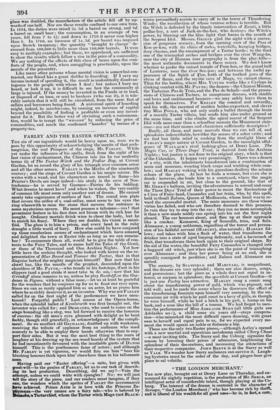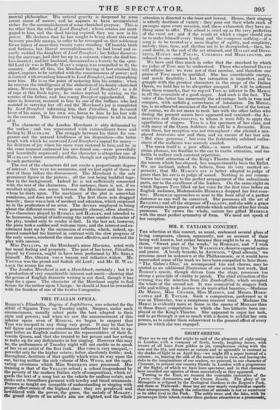" THE LONDON MERCHANT."
THE new play, brought out at Drury Lane on Thursday, and an- nounced for nightly repetition, is the production of Mr. SERLE, an intelligent actor of considerable talent, though playing at the Co- burg. The interest of the drama is centered in the character of Scroope," the London Merchant ;" who has become rich by thrift., and is liberalaf his wealthfor all good uses—he is, in faet,a coma raercial philosopher. His natneta gravity is deepened by some secret cause of sorrow, and he appears to have accumulated riches for the accomplishment of some cherished purpose. This is no other than the ruin of Lord Beaufort; whose estates are mort- gaged to him, and the deed having expired, they are now in his power. He declares that he has sought to bring about this event by every possible means, in order to be revenged on that nobleman for an injury of more than twenty years standing. Of humble birth and fortunes, but liberal accomplishments, he had loved and se- cretly wedded the daughter of Lord Beaufort; her father discover- ing the marriage, had shut her up in a convent, where she died bro- ken-hearted; and her husband, denounced as a heretic by the spite- ful Lord (it was in Bloody MARY'S reign), was compelled to fly the country. After all this, the Merchant having at last attained his object, appears to be satisfied with the consciousness of power ; and is content with revealing himself to Lord Beaufort, and triumphing over him. He is on the point of restoring him his estates ; when he receives the intelligence of the abduction of his dearly-cherished niece, Mariana, by the profligate son of Lord Beaufort : in a fit of rage at this fresh injury, he makes reprisal by seizing on the estates of the father, and has young Beaufort apprehended. His niece is, however, restored to him by one of the ruffians who had assisted in carrying her off; and the Merchant's joy is completed by Lord Beaufort informing him that Fitzallan, the favoured lover of his niece, is his own son, borne to him by his lost wife in the convent. This discovery brings forgiveness to all in need of it.
The character of the London Merchant is ably delineated by the author ; and was represented with extraordinary force and feeling by MACREADY. The struggle between his thirst for ven- geance and the natural kindliness of his disposition—the bitter laugh with which he answered Lord Beaufort' s appeal for mercy— his delirium of joy when his niece were restored to him, and he in the same moment embraced his new-found son—were powerfully and beautifully expressed and the character is altogether one of Macalsanv's most successful efforts, though not equally felicitous in each particular.
The rest of the characters did not excite a proportionate degree of interest : they were too numerous, and we lost sight of three or four of them before the denouement. The Merchant is the sole prominent figure in the picture ; all the rest being huddled toge- ther in the background. Indeed he is not sufficiently connected with the rest of the characters. For instance, there is not, if we recollect aright, one scene between the Merchant and his niece whom he doats upon. The machinery of the plot is somewhat cumbrous, and does not work well. The first three acts dragged heavily ; there was a lack of incident and situation, which surprised us in the production of an actor. The devices employed to bring about the different events were generally clumsy, often abortive.
Two characters played by RUSSELL and HARLEY, and intended to be humorous, instead of enlivening the rather sombre character of the play, tended only to render it dull. In the last act, however, the piece took a sudden and welcome turn; and the interest and ex- citement kept up by the succession of events, which, indeed, ap- peared somewhat too hurried in contrast with the slow progress of the early scenes, rendered the close most effective, and crowned the play with success. Miss PHILLIPS, as the Merchant's niece Mariana, acted with her usual feeling and propriety. The part of her lover, Fitzallan, played by COOPER, ought to have been performed by Mr. SERLE himself. Mrs. ORGER was a buxom and talkative widow. Mr. YOUNGE was the proud and foolish old Lord ; and Mr. H. WAL- LACE the scamp his son.
The London Merchant is not a Hunchback, certainly ; but it is a production of very considerable interest and merit—showing that the genius of English dramatic writing is not dead, though it has slept for a space. The character of the Merchant ought to find favour for the author upon 'Change : he should at least be rewarded with the freedom of one of the twelve Companies.



























 Previous page
Previous page